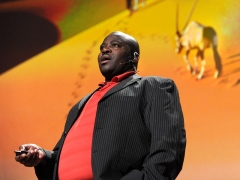
Wataru Narita shares one of his favorite images, taken while kayaking.
TED Talks are available in 102 languages, from Albanian to Vietnamese, thanks to the tireless work of our volunteer translators. So far, more than 10,000 volunteers have created upwards of 44,000 talk translations — and today, the TED Blog brings you a Q&A with one of them. Here, meet Wataru Narita of Tokyo, Japan.
1. What do you do by day?
On weekdays, I work in the management side of the media and communications industry. On weekends I grow vegetables at a community garden, and occasionally go kayaking.
2. What drew you to TED?
I don’t remember how I first landed on TED.com, but I remember being immediately
captivated by it because the ideas presented were so full of positive surprises. Watching TED Talks has become an indispensable spice of life to me.
3. What was the first talk you translated and how did you pick it?
 Lawrence Lessig: Laws that choke creativity
My first translation was “Laws that choke creativity” by Lawrence Lessig. While I was excited to see TED launch the Open Translation Project in 2009, I was undecided for a while on whether or not to join it. I just wasn’t confident that someone like me — with no formal language training — could do it. Still, I was a fan of Lessig’s books and the opportunity to translate his talk was very appealing to me. Curiosity won in the end. It totally changed how I spend my free time.
Lawrence Lessig: Laws that choke creativity
My first translation was “Laws that choke creativity” by Lawrence Lessig. While I was excited to see TED launch the Open Translation Project in 2009, I was undecided for a while on whether or not to join it. I just wasn’t confident that someone like me — with no formal language training — could do it. Still, I was a fan of Lessig’s books and the opportunity to translate his talk was very appealing to me. Curiosity won in the end. It totally changed how I spend my free time.
4. What have been your favorite talks to translate? Why?
 John Kasaona: How poachers became caretakers
I like life stories told with candor and humor — like Bunker Roy’s “Learning from a barefoot movement,” John Kasaona’s “How poachers became caretakers” and “John Francis walks the Earth.” They remind me of the importance of having a playful spirit under any circumstance.
John Kasaona: How poachers became caretakers
I like life stories told with candor and humor — like Bunker Roy’s “Learning from a barefoot movement,” John Kasaona’s “How poachers became caretakers” and “John Francis walks the Earth.” They remind me of the importance of having a playful spirit under any circumstance.
5. Which talk was the most difficult for you to translate and why?
I would say Brian Greene’s “Making sense of string theory.” I was so fascinated by his talk that I decided to translate it, even though I don’t have much background in physics or astronomy. I had to learn a lot to complete the translation, but it was quite a memorable experience for me.
6. What’s a phrase in your language that you wish would catch on globally?
I’d like to share the phrase, “七転び八起き [nanakorobi yaoki].” Simply put, it means, “Seven times down, eight times up.” This is a saying that encourages perseverance to keep trying, even if you fail more than once.
Comments (6)
Pingback: American Steroids Online
Pingback: TEDx Volunteer Translators & their euphories – Studio KAKU presents